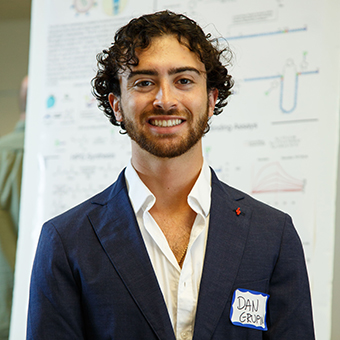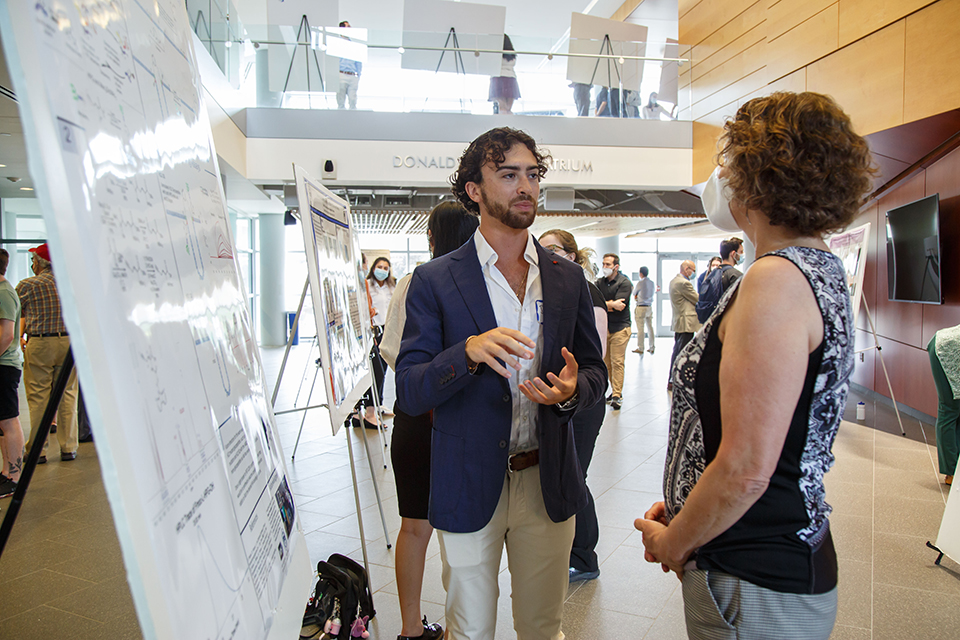Daniel Grupin
Krauss Lab
Department of Chemistry
Brandeis University
Synthesis of Fmoc-L-HPG-OH and its Applications in the Synthesis of Glycoclusters for HIV Vaccine Design
 Carbohydrate-protein interactions play an important role in both host-pathogen recognition and cell signaling, as evident with broadly neutralizing antibodies (bnAb) that are capable of neutralizing multiple HIV-1 strains. The bnAb PGT-128, for instance, is capable of neutralizing ~70% of HIV-1 strains tested and recognizes the V3 loop on gp120 of the viral envelope spike (Env) glycoprotein on HIV-1’s surface. Mimicking such interactions between carbohydrate-binding proteins (CBP) and carbohydrate clusters would have applications in the development of HIV vaccines, a disease affecting more than 37 million people. As a vaccine design approach, our lab has developed directed evolution methods which provide antigenic mimics of HIV. Preparation of glycopeptide mimics requires the non-canonical amino acid L-Fmoc-homopropargylglycine (HPG), which provides a handle for the copper-assisted azide-alkyne cycloaddition (CuAAc) click reaction to attach sugar moieties. Optimized large-scale synthesis of L-Fmoc-HPG will be discussed in the poster. In addition to this, the poster will discuss the binding analysis of glycocluster hit H22 and its mutations with PGT-128 by using Bio Layer Interferometry (BLI). Future directions for this research would be synthesizing a vaccine candidate and in vivo experiments immunizing rabbits to generate HIV-binding antibodies.
Carbohydrate-protein interactions play an important role in both host-pathogen recognition and cell signaling, as evident with broadly neutralizing antibodies (bnAb) that are capable of neutralizing multiple HIV-1 strains. The bnAb PGT-128, for instance, is capable of neutralizing ~70% of HIV-1 strains tested and recognizes the V3 loop on gp120 of the viral envelope spike (Env) glycoprotein on HIV-1’s surface. Mimicking such interactions between carbohydrate-binding proteins (CBP) and carbohydrate clusters would have applications in the development of HIV vaccines, a disease affecting more than 37 million people. As a vaccine design approach, our lab has developed directed evolution methods which provide antigenic mimics of HIV. Preparation of glycopeptide mimics requires the non-canonical amino acid L-Fmoc-homopropargylglycine (HPG), which provides a handle for the copper-assisted azide-alkyne cycloaddition (CuAAc) click reaction to attach sugar moieties. Optimized large-scale synthesis of L-Fmoc-HPG will be discussed in the poster. In addition to this, the poster will discuss the binding analysis of glycocluster hit H22 and its mutations with PGT-128 by using Bio Layer Interferometry (BLI). Future directions for this research would be synthesizing a vaccine candidate and in vivo experiments immunizing rabbits to generate HIV-binding antibodies.
Personal Statement
Having the opportunity to work full-time in the Krauss Lab over the summer has been an incredibly satisfying and inspiring opportunity. Up until this summer, my hands-on laboratory experience was extremely limited from both an academic and laboratory standpoint due to the very real and legitimate safety concerns associated with the COVID-19 pandemic. From an academic point of view, the past seven laboratory courses that I took at Brandeis (including physics, general chemistry, organic chemistry, and biology) were offered exclusively online through the “Beyond Labz” software. Although the platform allowed me to perform virtual titrations, extractions, and various other experiments, the platform prevented me from truly grasping what it meant to be a scientist because the “mini-games” did not allow me to learn proper laboratory techniques or to make mistakes and learn from them. Moreover, my previous laboratory experience as an undergraduate research assistant was limited due to the COVID-19 guidelines and restrictions that made the training process longer than expected.
Thanks to the M.R. Bauer Foundation Summer Science Research Fellowship, my experience this summer in the Krauss Lab with my mentors, Dr. Mahesh Neralkar and Dan Polyak, has been completely different in the best way possible. Instead of being limited with my exposure and time in the lab, I was able to come in every morning and work with postdocs and graduate students that specialize either in chemical biology or synthetic organic chemistry, exposing me to two different, yet interconnected disciplines of science. By working with researchers in both disciplines, I discovered my passion for chemical biology after working on the synthesis of glycopeptides that mimic the HIV-1 Env structure so that they can bind to the HIV antibody PGT-128. One of my favorite parts of this project was incorporating the non-canonical amino acid, “HPG”, that I had previously made with the synthetic organic chemists into the peptide so that it can be used to generate the glycopeptide by combining it with glycan azides. I really liked this project, because it also relates to another passion of mine, medicine and drug discovery, since the ultimate goal is to create a vaccine for HIV. Ultimately, this opportunity impacted my scientific life by confirming and reigniting my desire and passion to pursue an MD/PhD after graduating from Brandeis University.
Giving Back Reflection
This summer I also had the opportunity to give back to the various communities that I am a part of by volunteering for Global Medical Brigades at Brandeis University; volunteering for Mayflower Hospice; and by working on re-starting the undergraduate Chemistry Club at Brandeis University. For Global Medical Brigades, I have been networking with various hotels and motels in the Barnstable County area in Cape Cod to obtain personal hygiene products that are going to be sent to impoverished communities in Honduras. Next with Mayflower Hospice, a startup, I worked with the clinical and medical directors by helping them recruit registered nurses and licensed independent clinical social workers for their team that cares for patients with end-of-life needs. Lastly, I worked with several other undergraduate students on re-starting the Chemistry Club so that we could provide valuable mentorship to underclassmen once the Fall semester starts with regards to undergraduate research, becoming a teaching assistant, and applying to graduate school programs.
